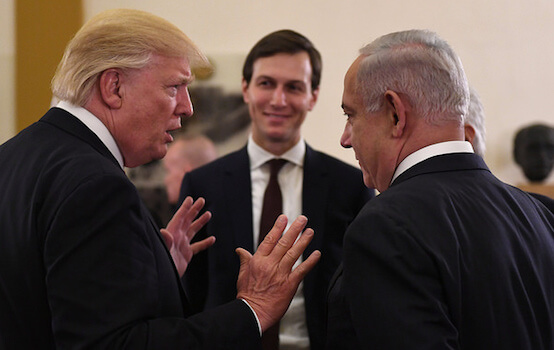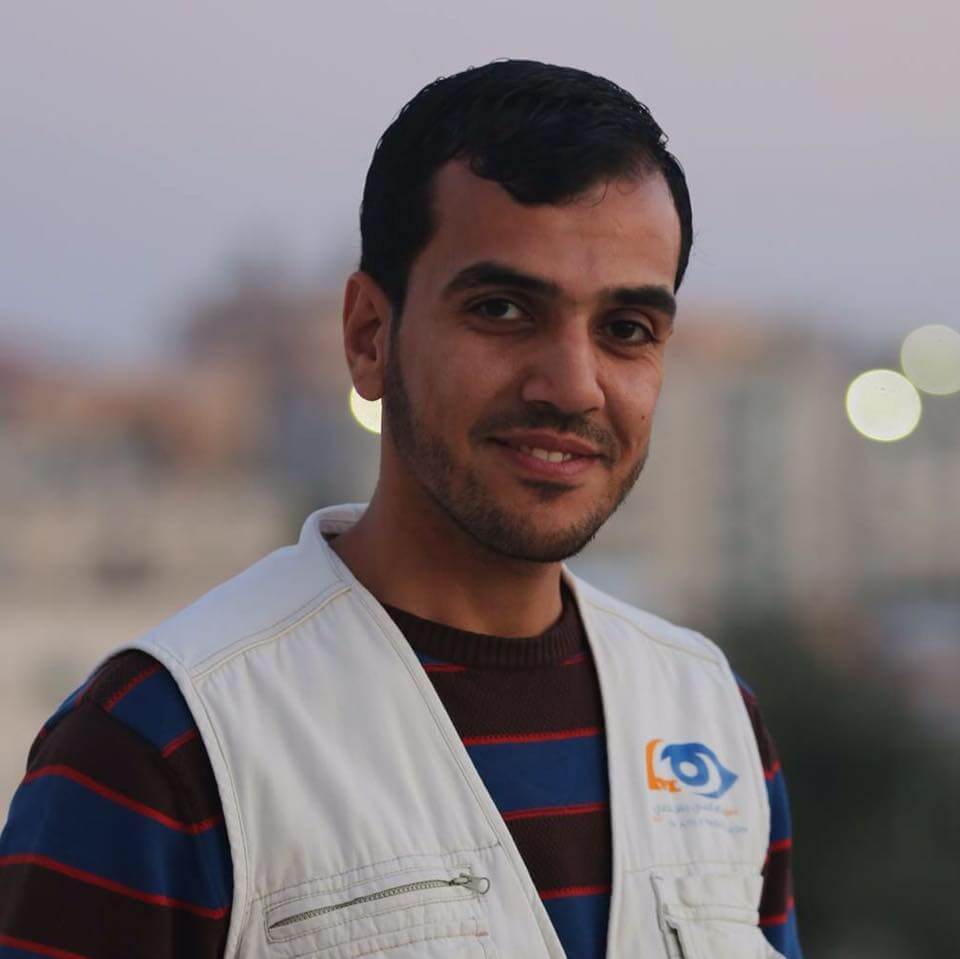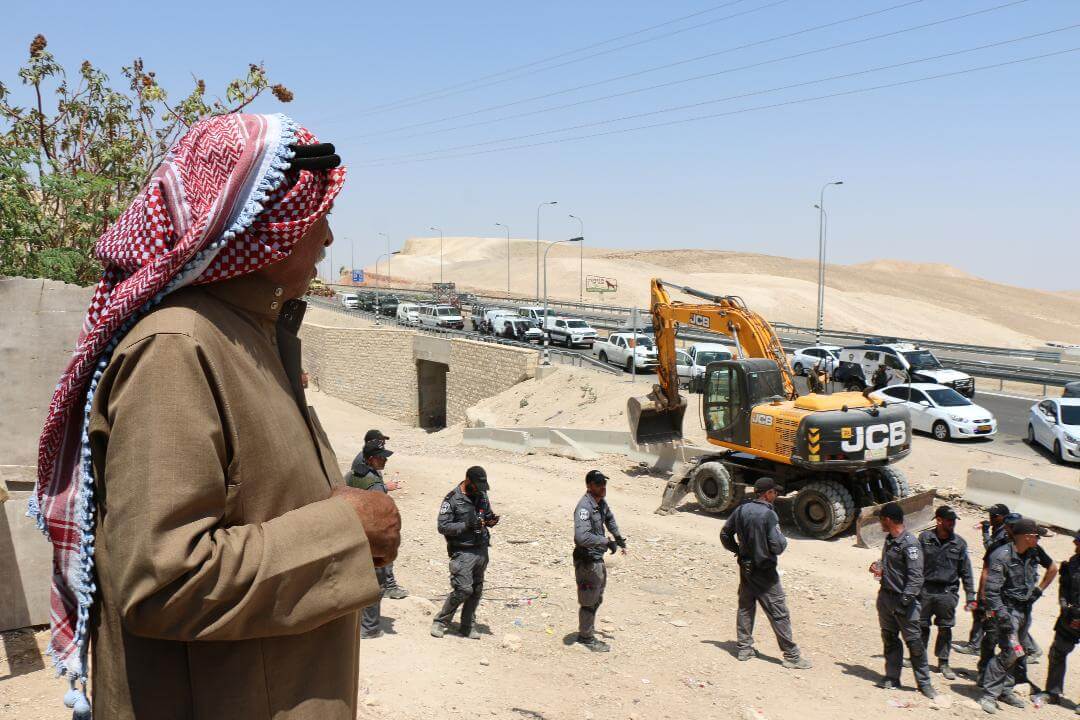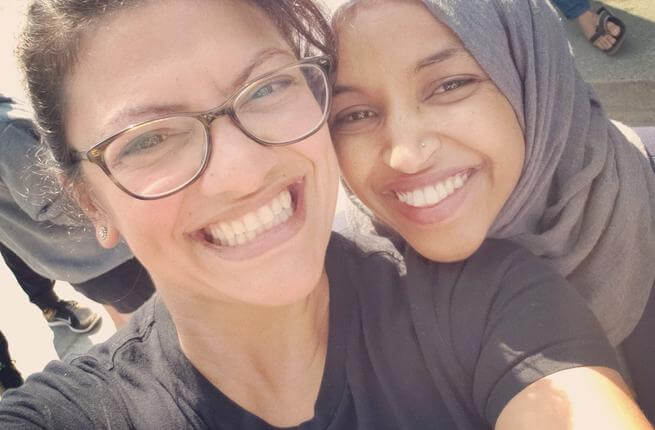Looking back on this year, it is difficult to choose one moment, one tragedy, or one political decision that stands out among the rest. Palestinians witnessed a tumultuous year in 2018, as they saw hundreds killed from the West Bank to Gaza, their rights slowly stripped away inside Israel, and the heart of Palestinian identity, Jerusalem, pushed further out of reach.
We have seen the Israeli occupation expand its reach through its growing settlement enterprise, increasing home demolitions, and extrajudicial killings of unarmed protesters, all with the full backing of the United States and relatively no accountability from the international community.
2018 marked 25 years since the Oslo Accords were signed, but a fair and just peace agreement for the Palestinians remains far out of reach — the dream of an independent Palestinian state even further.
The Palestinian Authority (PA), which was supposed to be a temporary government according to the accords, has developed into a despotic regime, focused more on quashing dissent and policing free speech than achieving liberation and statehood.
2018 also marked 70 years since the Nakba, the tragedy that has shaped the Palestinian issue for generations.
But as evidenced by the ongoing fight for the rights of refugees in Gaza’s Great March of Return, the fight against expulsion in places Silwan and Khan al-Ahmar, and the fight for equal rights as citizens in Israel, the Nakba, or “catastrophe”, of the Palestinian people did not end in 1948.
The impact of Trump

It goes without saying that perhaps that most defining moment of the year actually took place in late 2017, when President Donald Trump announced that the US would be recognizing Jerusalem as the capital of Israel.
The decision sparked widespread protests that lead to the arrest of hundreds of Palestinians and the injury of many more. Even after the initial protests died down, Trump’s Jerusalem decision has continued to be a feature of nearly every demonstration, big and small, across Palestine.
Over the course of the year, the Trump administration has relentlessly unleashed a series of political decisions aimed at harming the Palestinian people and forcing their leadership to the negotiating table.
From defunding UNRWA and USAID in the West Bank and Gaza, to moving the Embassy from Tel Aviv to Jerusalem, Trump’s decisions will have a lasting political impact on the region. The human impacts have already begun to be felt.
More than 60 Palestinians were gunned down by Israeli forces on the Gaza border on May 14th when they were protesting Trump’s decision to move the embassy.
Last week, a three-year old Palestinian refugee boy died waiting for treatment in a Lebanon hospital. Many have attributed his death to the UNRWA financial crisis, saying that the family could not afford to pay and that the hospital delayed the treatment because they were waiting for the insurance payment from UNRWA.
As time goes on, more than 5 million Palestinian refugees will feel the effects of UNRWA’s financial crisis in the form of job cuts, reduced healthcare coverage, and the shut down of primary schools across the region.
The existence of UNRWA is truly essential to the lives of Palestine’s most vulnerable communities. Living in the Aida Refugee Camp in Bethlehem, I have witnessed my neighbors skip doctor visits and unable to purchase necessary medications due to the fact that the current health care they receive UNRWA doesn’t cover all of their needs.
If the already lacking coverage is taken away from them, it is not out of the question that many more will suffer the fate of that young boy in Lebanon.
The UN has reported that despite a rise in humanitarian needs across the occupied Palestinian territory, funding levels for humanitarian interventions declined significantly: only US$221 million had been received, compared to the $540 million requested in the 2018 Humanitarian Response Plan.
Gaza & The Great March of Return
Much of this year’s coverage of news in Palestine has focused on the besieged Gaza Strip, which entered its 11th year under siege in 2018.
With every passing day, the situation in Gaza grows more and more dire. People see only a few hours of electricity a day, unemployment rates are at an all time high, and hospitals are closing their doors due to lack of medications.
In 2018, the UN reported that around 1.3 million people in Gaza, or 68 per cent of the population, were food insecure.
We have reported on a series of stories from the Gaza Strip this year, each one more distressing than the last.
We have seen children with cancer forced to travel alone to the West Bank for treatment without their parents, UNRWA employees set themselves on fire after losing their jobs, and the ever rising death toll from the Great March of Return.
On Saturday, one Palestinian was killed and six more were injured along the Israeli border fence.
UN documentation reported on December 28th that the death toll from Gaza’s Great March of Return stood at 180, and that over 23,000 people had been injured in the protests. Among the dead are journalists, medics, women, and children.
This year marked the highest death toll in a single year since the Israeli offensive on Gaza in 2014, and according to UNOCHA, the highest number of injuries recorded since the group began documenting casualties in the occupied Palestinian territory in 2005.
The Great March of Return has galvanized Palestinians from across the Gaza Strip to demand an end to the crippling Israeli siege.

Despite nine months of death and injuries, and no tangible wins for the protesters, the continued participation of Gazans in the march is evidence of the growing desperation in the coastal enclave.
With nowhere to go, no future for Gaza’s young people, and no medicine for the sick, the only remaining choice for many is to try as hard as they can to tear down the walls and fences surrounding them, knowing full well that death awaits them at the borders.
Growing discontent with PA
In the PA-controlled West Bank, there is a growing sense of discontentment with the government and its leaders, who continue to prioritize their consolidation of power and resources over the rights of the people.
The state of hopelessness and frustration among Palestinian citizens is on a steady rise, with polls showing that Palestinians ranked corruption as the second largest problem they face after the economic crisis – higher than the Israeli occupation, which ranked third.
Palestinian economic and social decline has led to higher rates of poverty and unemployment, with college graduates witnessing the highest rates of joblessness.
The Palestinian Legislative Council (PLC), once the most important official instruments of control and accountability for the government, has been dysfunctional for the past 11 years.
The PA’s executive authority and security apparatuses have continued to impose restrictions on media and journalists through the Cyber Crimes Law, blocking websites that publish dissenting voices, and detaining journalists and activists critical of Mahmoud Abbas and his regime.
Over the summer, PA forces violently suppressed youth-led protests that criticized the government’s policies in Gaza and its security coordination with Israel, which has been denounced as a “revolving door” policy funneling Palestinian activists from PA jails to Israeli prisons.
In the wake of a spate of attacks earlier this month allegedly orchestrated by Hamas, demonstrations erupted in support of the PA’s rival faction, and in condemnation of Israel’s punitive ongoing home demolitions, road closures, and massive arrest campaigns.
Video footage of the protests showed PA security forces using batons to beat demonstrators, many of them women.
Despite widespread public outcry and ongoing protests, the PA is moving forward with a controversial social security law which will see citizens that work in the private sector paying seven percent of their monthly salaries taxes to the Palestinian Social Security Corporation (PSCC), with no clauses exempting workers who receive minimum wage.
While the law claims workers will be able to apply for a retirement pension at age 60, it stipulates that widows, orphans, and the families of Palestinians killed by Israel will not be eligible to receive benefits.
Palestinians have voiced their opposition to the law, citing concerns that if subjected to monthly deductions, workers receiving already low wages will not be able to provide for their families or pay off hefty bank loans, which many Palestinians use to purchase homes, cars, etc.
The primary opposition to the law lies in the fact that many Palestinians do not trust the government to uphold its end of the deal, and that under the Israeli occupation and an increasingly unstable PA, there’s no guarantee they would ever see the benefits of their contributions.
Business as usual for the Israeli occupation
According to UN documentation, a total of 295 Palestinians were killed and over 29,000 were injured in 2018 by Israeli forces in the occupied West Bank, East Jerusalem, and Gaza.
Over 459 Palestinian structures in the West Bank and East Jerusalem were demolished by Israeli forces, marking a slight increase from 2017. The demolitions resulted in the displacement of 472 Palestinians, including 216 children and 127 women.
In the wake of this month’s spate of attacks on Israeli settlers and soldiers, Israel has stepped up its efforts to demolish the homes of Palestinians accused of carrying out attacks on Israelis, a policy that has been widely criticized for years as collective punishment.
Israeli Prime Minister Benjamin Netanyahu has doubled down on so-called “deterrence” efforts, instructing security officials to fast track punitive home demolitions, despite previous recommendations from an Israeli military committee that the practice did not deter attacks.
Last week, the Israeli Knesset passed the first reading of a bill to forcibly transfer families of Palestinians involved in attacks against Israelis, despite heavy opposition from intelligence and army officials.
If passed into law, it would see that within a week of an attack or attempted attack, the Israeli army would be permitted to expel the relatives of the Palestinian assailants from their hometowns to other areas of the West Bank.
Forcible transfer is considered a war crime under international law.
Since the election of Trump, the West Bank has witnessed a steep increase in the expansion of Israeli settlements, which are illegal under international law.
In the 22 months before Trump was elected, 4,476 settlement housing units were approved, according to settlement watchdog Peace Now. But since his election, that figure has more than tripled to 13,987 housing units.
Earlier this week, Israel advanced plans for nearly 2,200 living units in 47 settlements.
Palestinians in the West Bank have also witnessed a frightening increase in settler attacks on them and their property, with settlers more emboldened than ever before.
In 2018, UNOCHA recorded 265 incidents where Israeli settlers killed or injured Palestinians or damaged their property, marking a 69 per cent increase from 2017.
One Palestinian woman, 48-year-old Aisha al-Rabi, a mother of eight, was killed in October when settlers attacked her family’s car with rocks as they were driving home in the Nablus district of the northern West Bank.
Some 7,900 trees and 540 vehicles were damaged or completely destroyed in settler attacks, the UN reported.
The Palestinians that shook 2018
Amid all the devastation of 2018, several Palestinian faces have emerged from the darkness to offer a sense of hope, inspiration, and resilience for their people.
The following men, women, and children have been iconicized through social media for their roles in combating the Israeli occupation and bringing the plight of the Palestinian people to the international stage.
Ahed Tamimi

Ahed Tamimi was propelled on to the international stage when she was arrested by Israeli forces in December 2017 after she slapped an Israeli soldier during a raid on her hometown of Nabi Saleh.
As she severed out an 8-month sentence in Israeli prison, she shed a new light on the issue of Palestinian child prisoners and the struggles of Palestinian youth under occupation.
By the time she was released, she had reached star status in Palestine and beyond, and has remained outspoken in her criticism of the Israeli occupation, travelling the world raising awareness about the Palestinian cause.
Yasser Murtaja & Razan al-Najjar


During the Great March of Return, Israeli forces shot and killed Palestinian journalist Yasser Murtaja and medic Razan al-Najjar, drawing outrage from the Palestinian and international community.
Their deaths highlighted Israel’s widely criticized open-fire policy along the Gaza border, and the ongoing killing of unarmed civilians.
The funerals of both Murtaja and al-Najjar drew thousands of mourners, and their status as heroes of the Great March of Return has been memorialized on Palestinian social media.
The Bedouins of Khan al-Ahmar

As the battle to save their village came to a head this year, the bedouins of Khan al-Ahmar remained steadfast in their nonviolent resistance to the Israeli occupation’s efforts to expel them from their lands.
Through grassroots efforts, the people of Khan al-Ahmar galvanized international support for their struggle, resulting in the indefinite postponement of the village’s demolition.
Rashida Tlaib

Democrat Rashida Tlaib of Michigan’s 13th Congressional District made headlines across the US and the world as one of the first Muslim-American women to be elected to Congress, and the first ever Palestinian-American woman to do so.
In Palestine, Tlaib’s win was a form of poetic justice: the descendant of Palestinians from a small occupied West Bank village would now be serving in one of the highest levels of US government.
Since her election, Tlaib has been outspoken in her defense of the BDS movement, and has even announced that she will be leading a delegation of her colleagues to Palestine, as an alternative to AIPAC’s annual Israel trip for new members of congress.
Looking forward
As we enter the New Year, there is little reason for optimism in Palestine.
The Israeli occupation continues to tighten its grip with the help of the US, and the prospect of any reconciliation between Fatah and Hamas and free democratic elections in Palestine are virtually nonexistent.
Palestinians in the West Bank continue to see their family members cycled through the Israeli prison system, with 5,554 Palestinians in prison as of November.
The current security situation in the West Bank has created a climate in which Palestinians are scared to drive their cars between cities, fearful that a settler attack or wrong move at a checkpoint could spell their death.
In East Jerusalem, Palestinian refugees are bracing for the worst as Israel moves forward with its plans to shut down UNRWA’s operations in the city.
In Gaza, the Great March of Return pushes on into its 10th month, and an end to the Israeli and Egyptian siege is nowhere in sight.
The Trump administration continues to tout its “deal of the century,” which many Palestinians anticipate will attempt to erase any Palestinian claims to Jerusalem, and force them to once again compromise their rights for the sake of Israel and the settlers.
The political future of Palestine is as uncertain as ever, and 2019 will likely see a further deterioration of the humanitarian situation here.
This year, we have interviewed hundreds of Palestinians from the borderlines in Gaza to refugee camps of Bethlehem. Countless people have have opened up their homes to Mondoweiss, to tell us, and show us, the reality of their existence under occupation.
Time and time again, we have asked people what their message is to the world, and to the Israeli government. And time and time again, there is one common theme to every person’s answer: sumud, or steadfastness.



it’s hard wrapping my head around all the horrible things that happened this year. even tho, as Yumna reported and we all know too well, there have been “no tangible wins” from the Great Return March, i do think the persistence gargantuan efforts of protestors, and sacrifices of martyrs, have made an impact greater than their loss. that’s a hard call to make but i deeply honor the bravery, and so many brave hero’s lives cut short, so many beautiful people who have every right to live in freedom with full rights. may your calls be amplified even more.
thanks Yumna, thanks mondoweiss and especially thanks to all the people who opened their doors. praying for a breakthrough in 2019. sumud.
Excellent review of the past year. Thanks!
http://www.dci.plo.ps/en/article/11335/January-1,-2019-Report-Appearance-and-reality-Israeli-provocations-and-violations-in-their-own-words-(December-2018-Edition)
“The Palestine Liberation Organization Department of Public Diplomacy and Policy,” January 1/19
“January 1, 2019: Report: Appearance and reality: Israeli provocations and violations in their own words (December 2018 Edition)”
EXCERPT:
“PLO Executive Committee Member Dr. Hanan Ashrawi: ‘Real incitement stems from Israel’s cruel and unfettered military occupation of Palestine and its illegal settler colonial project. The Israeli hardline coalition government led by Benjamin Netanyahu is responsible for practicing blatant discrimination and generating a culture of hate and racism in Israel, inciting violence and feeding extremism. Such acts and words are undermining the chances of peace and enhancing hostility and mistrust between both peoples. Updated regularly, this report includes examples of derogatory and inflammatory comments and incitement by Israeli government officials and leaders, as well as statements and acts of hatred and violence by opinion-makers and other members of Israeli society.'”
Excellent article regarding the major developments affecting the 4.9 million Palestinians of East Jerusalem, the West Bank and Gaza. However, it fails to include important events affecting the 1.8 million Palestinian citizens of apartheid Israel and the 5.5 million Palestinian refugees in neighbouring Arab countries. The BDS campaign launched by Palestinian Civil Society clearly states that the Palestinian people are one entity and their struggles in all of occupied Palestine and in the diaspora have the same goals. One such important person who should have been recognized is Dareen Tatour the Palestinian citizen of Israel who was jailed and continues to challenge the apartheid system with her patriotic poems.
At first we learn that there are “no tangible wins for the protesters”, and then we find out that “… the only remaining choice for many is to try as hard as they can to tear down the walls and fences surrounding them, knowing full well that death awaits them at the borders”. Why is it that no one at Mondoweiss has the courage to express even an ounce of criticism regarding the border protests? It’s so obvious that the whole idea is a dismal failure (“no tangible wins for the protesters”), so surely “the only remaining choice” cannot be just more of the same. One would think that someone at Mondoweiss actually cares about the Palestinians, but alas the Palestinians are not really the topic at hand. The topic at hand is an obsessive anti-Israel agenda presented as if it’s a deep concern for the Palestinians. But as we see in countless articles, a deep concern for the Palestinians means that they can get your support for sending their people into a pointless and failed battle.
Part of real friendship is the ability to tell your friend that he’s mistaken. Mondoweiss does not support the Palestinians at all. Israel is the hated enemy, and the (Palestinian) enemy of that hated enemy merely serves as a tool in expressing animosity. And, by the way, Palestinian intellectuals will tell you that they are aware of the fact that “support” for them is not about them at all. That’s the real tragedy.